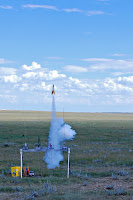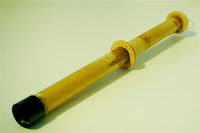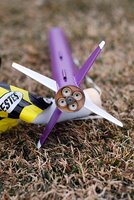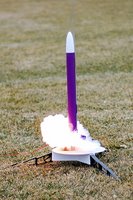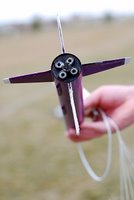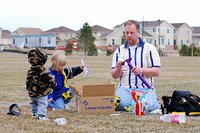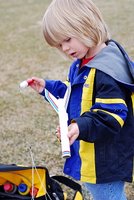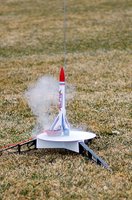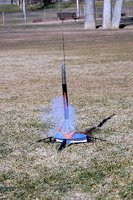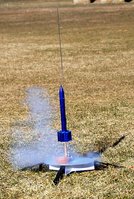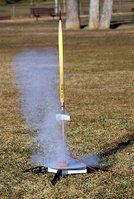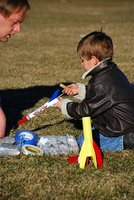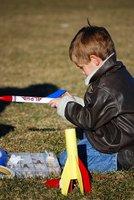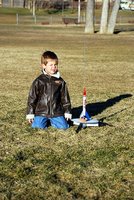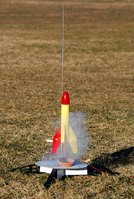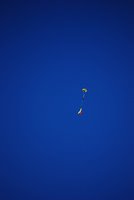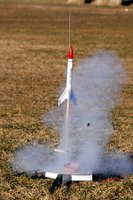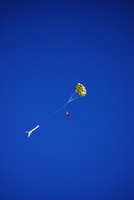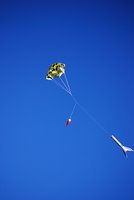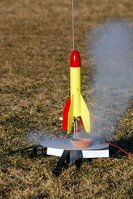Wednesday, December 12, 2007
Levitt, Freakonomics
The best part of the book for me was that they would give some surprising or shocking conclusion to something and then they would describe how it came to be. Chapters 1, 2, and 5 were enlightening to spectacular while 3, 4, and 6 were just interesting to me. Chapter 1 was about incentives and cheating, how incentives can go wrong, who cheats, and how cheaters might be caught. Chapter 2 was about information so they detailed a key time in the bringing down of the KKK and considered real estate agent performance.
Do parents really matter? That is the question in Chapter 5 and data shows that the amount of time kids spend watching TV doesn't positively correlate their standardized test scores. In fact, a list of 16 or so issues are considered and I was surprised at others like regular trips to the museum or parents reading daily to the kids don't positively correlate.
Monday, December 10, 2007
Pika Pika
Some of the stuff is clearly flashlights but other stuff looks pixelated - to the point that it seems like the photos were edited with a Koala Pad on a C64. Fun idea though!
Tuesday, November 27, 2007
We gotta go to the crappy town where I'm a hero.
Well done, Joss and crew - that was some great stuff you all created.
Friday, November 23, 2007
That's just freaky.
... recently she shot a pulse into one [Bose-Einstein condensate] and stopped it — turning the BEC into a hologram, a sort of matter version of the pulse. Then she transferred that matter waveform into an entirely different BEC nearby — which emitted the original light pulse.
Awesome... and freaky :)
Wednesday, November 14, 2007
To find out what you don't know, you have to do
That's one of the big things I've learned over the past three years at Masten Space Systems - you never know how much you really don't know until you try to find out.
We often talk about the importance of knowing what you know and don't know, but sometimes we forget how to discover what we really don't know. It isn't just about thinking and analyzing.
Monday, November 12, 2007
Solar Power Options
If the neighbor was still there and was still offering the panels, I'd take them now because it sounds like you don't need batteries now. My understanding, based on a brief discussion with BB, is that Xcel will buy any excess electricity generated so there is no need for batteries any more. Cool - too bad the neighbor moved!
I just read about a new option today on Wired. I was actually enjoying this excellent article, Thanks to Google's Tools, I'm the Most Efficient Time-Waster Ever and then I spotted this article, Selling Homeowners a Solar Dream. Pretty interesting stuff: this new company puts everything in place and you agree to buy your power from them at a fixed rate.
Citizenrē - take a look - interesting.
Wednesday, November 07, 2007
XO Production Starting / Buy One Get One
Yes, they need medicine, food, etc. but help them bridge the technology gap too.
Monday, November 05, 2007
Launch Log 2007.11.03
The unfortunate landing: by catching the tip of the fin here, it cracked the fin root and will require the joint be soaked in thin epoxy before flying the Bullet again.

Shanelle caught this pretty launch while we were there. This is not one of our rockets but it sure is a nice picture so I'm posting it.

Thursday, November 01, 2007
installing mysql and sshd on Ubuntu 7.10
Here's what I ended up doing, and I like it:
System -> Administration -> Software Sources
Ubuntu Software
X Canonical-supported Open Source software
X Community-maintained Open Source software
X Software restricted by copyright or legal issues
Third-party Software
X http://archive.canonical.com/ubuntu gutsy partner
Close
Applications -> Accessories -> Terminal
sudo apt-get install mysql-server
sudo apt-get install openssh-server
Good stuff.
Wednesday, October 31, 2007
von Braun, Space Frontier
Tuesday, October 30, 2007
Rocketplane Global... XCOR Aerospace...
On the surface, XCOR seems to me to be the most likely company in the new race-to-space to succeed. The things that I see on the surface is that they have a couple rocket planes that actually fly with the rockets, they have developed and patented technologies critical to improving the engines (and others are using the technologies), and they aren't publicly speculating / promising when flights will be available.
XCOR's Xerus should be impressive if they can pull it off. Having built and flown the EZ-Rocket 20+ times and built and flown the next generation, Rocket Racer, it seems that they are evolving and iterating fantasticly.
Rocketplane has all the right people and just dumped the Leer that they've been working on for a couple years. To me, that says that they have no hope - sounds just like a dot-com run by rich kids. On the other hand, they are contracting almost everything out except for the stuff that is truely their core competency.
No matter what happens - those people in those companies are doing some way cool stuff. Good luck to all - yes, I think that it takes some luck to make a successful company.
Wednesday, October 24, 2007
The purpose of the countdown is to:
Assure maximum safety for flight crews (if any), ground crews, and equipment, while the vehicle is prepared for flight.
Avoid wearing out critical flight or ground equipment by activating it too long before launch.
Enable the launch director to launch at an exact instant - corresponding, say, to a favorable position of celestial objects, or to requirements for orbital rendezvous.
Synchronize launch preparations with supporting operations, such as the readying of radars and tracking cameras, or the setting up of road blocks near the launch site.
- Dr. Wernher von Braun
I think that for many hobby rocketeers with kids, that last bit may need to be changed to, "Synchronize launch preparations with supporting operations, such as the rounding up of the kids, the covering of the little ears, readying of radars, ...".
Friday, October 19, 2007
Close to a Thor Simulation

As for construction: Greg M provided the drill press and drilled the holes in the aft centering ring last night for the motor retainer. Joe at HobbyTown helped me find another forward centering ring since one of the rings provided with the kit was consumed by the motor retainer. I expect to set all the centering rings today and hope to do some glassing with Warren on the airframe tomorrow.
Wednesday, October 17, 2007
Clary, Rocket Man
A particularly interesting bit in the book was that they dispute a lot of Goddard's claims. Goddard was certainly an intelligent visionary, but he was exclusive and when he found people that were likely smarter or more qualified he either convinced them to work on his team or he shunned them. Goddard received more publicity than any other scientist, but he never published in scientific journals.
Sunday, September 23, 2007
Launch Log 2007.09.22
- Firehawk | 1/2 A3 | straight flight, higher than usual on 1/2 A3, drifted in recovery to land 100 yards from pad
- Renegade | C6 | Isaac did most of the prep, some weather cocking, drifted in recovery to land 120 yards from pad
- Army Man | B6 | impressive flight on a B6; no weather cocking but drifted a lot in recovery; landed about 200 yards from pad - bounced in a parking lot
- Stingray | 1/2 A3 | Spencer thought about prep'ing the rocket, weather cocked just enough to land close to pad on streamer recovery
- Purple Rhino | 4 x A10 | beautiful flight - love this rocket; no weather cocking; light wind so landed pretty close to pad
- Firehawk | 1/2 A3 | neighborhood kid joined us and did the prep; chute got stuff in ejection so motor ejected; no damage to rocket (other than lost motor retainer
- Stingray | 1/2 A3 | the ejection charge blew the nose-cone off the rocket and melted / deformed the top 60% of the fuselage; fuselage and nose-cone both recovered but rocket is damaged beyond repair because of the deforming of the fuselage
Before the final Stingray flight, we attempted to launch Mighty Mouse 2. I didn't have anything to use for flash-in-the-pan ignition, so we tried using solar igniters. After 3 attempts of getting rocket to pad, count-down, fail, check connection and for shorts, we gave up. We're thinking we need to build or buy a bigger launcher (one that uses a bigger battery anyway).

Spencer can't hold down the launch key, so Isaac holds the key and Spencer pushes the button.

Team work - and the rocket lifts off. Note that it is the person pushing the launch button that does the count-down.

Spencer finishes off his launch by doing his own retrieval. Well done, Spencer.

Bullet Ground-Testing
I prep'd the rocket (without an engine) and fed the wire for the Main ejection canister through the static port hole. Some people, so I'm told, do their ground-testing using a tube taped to the static port hole and they suck on the tube and then when they release, the AV bay represurrized and the computer fires the charges. I manually tested the computer separately a few days ago using it's built-
in test sequences and am just testing the separation in my ground-testing here.
Isaac thought that the test failed; he knew that the rocket wasn't going to launch but he thought that the chute was supposed to open. I used the canisters that I built a couple weeks ago and calculated that I needed about 2.5 g of FFFFg black powder for the ejection charge. A failure would have either been the whole upper section shredding from too big a charge or the nose code not popping out with force from too small a charge. Looks to me like the 2.5 g was just right.
Launch Log 2007.09.20
By the time we all ate, it was after 6:30p - that means the sun was about to go down. The field had been in use by a bunch of soccer teams, so we weren't just waiting to finish eating. We performed a rapid setup and prep on the Firestreak SST and launched it for a nearly perfect flight on a 1/2 A3.
The second flight was the Firehawk on an A3, but we had intended to use a 1/2 A3. With dusking coming and a bit of a break, we needed to keep landings close to the pad and that meant lower flights. The Firehawk is a great flyer and it went out of sight on the A3. There was almost no weather cocking so a long walk crossed my mind; fortunately, the chute only opened about 70% so decent was quick but not destructive.
Third flight was the Firestreak SST again but this time with Sam pushing the button. Another great flight on a 1/2 A3 - Spencer loves his rocket and set it asside with the intention of us launching it again right after launching the Stingray. The Stingray was unexciting on a 1/2 A3 - just too small to see in the near dusk conditions.
The Firestreak SST wasn't ready for a flight yet, so I loaded up Mighty Mouse for a flight on a C6. What was I thinking? Bad choice - so long Mighty Mouse. After spending some time looking for Mighty Mouse, we cleaned up and went home.
Sunday, September 16, 2007
Recovery Canisters
In the pictures above, you can see the first couple steps I use. Since the glue takes a moment to set and the ROL article is light on details on technique, I decided to record my steps for future reference. I found it easiest to put a partial ring of glue around the bottom before involving the e-match. There would be just a little gap open to get the e-match in. After the partial ring set, I put the e-match in and put just a small drop of glue in to hold the match and then let that set. Finally, I'd put in the final bit of glue and fill it out at the bottom.
The reason for the multiple steps was that putting too much glue in at once made it too difficult to manage the e-match. For the separation tests tomorrow, I'll need to add 3g of black powder to the canister and cap it with masking tape but the hard part is done now.
Monday, September 10, 2007
Launch Log 2007.09.09
When we got home from our trip in the mountains, we all went over to the field by our house and launched a few rockets of our own. The first flight was Spencers new purple rocket: the Firestreak SST. The Firestreak SST was purchased to replace Spencer's previous favorite: the 'silver nose' Outlaw which finally broke a fin and is no longer flyable. The Firestreak SST used a A3-4T for its first flight and flew great but recovery was not ideal: it uses a streamer for recovery but the streamer didn't appear to slow the rocket much.
Our second flight was Isaac's new Firehawk. Isaac built and put the decals on the Firehawk himself but I assisted with the glueing. Isaac even tied the shock cord on. We flew the Firehawk on an A3-4T but recovery here was also a bit of a problem: chute didn't open right and got tangled up. We'll have to watch it closely on the next flight - perhaps we didn't pack the chute good enough on this first flight.
It was a bit windy: we had to tilt the launch rod quite a bit to keep the rockets coming down within walking distance.
We flew Mighty Mouse on a B4-2 and Army Man also on a B4-2. Might Mouse landed in a pine tree but was recovered and had no damage. Great straight flight and drifted a bit in recovery. Army Man landed behind the school; Shanelle was hoping it was on the school but the boys recovered it without trouble. It flew great on the B4 with very little weather cocking (which is why it landed so far away :) ).
Sunday, September 02, 2007
Launch Log 2007.09.01
Our first flight was a flash-in-the-pan ignition of the Rhino. It flew 4 A10-3T's which carried it high and straight even though only 3 of the 4 motors lit. The second flight was the Mighty Mouse on a C6-7. The 7 second delay was nice because that kept the Mighty Mouse pretty close to the pad even though it was a nice, high boost. The third flight was Army Man with the split set for the center of the rocket. Past flights of Army Man suggested that it was heavy or not aerodynamic so we used a C6-3; I'm pretty sure it hadn't hit apogee when the chute opened. We had to walk quite a ways to recover Army Man but we did find it. Finally, we launched Might Mouse 2 for the first time. We used 3 A3-4T's with a flash in the pan (but the pan in this case was a Cherry Coke can rather than our usual ceramic dish). I was worried that the flash wouldn't light all motors because the can wasn't as close as I usually like but all motors did light and it was high and straight.
We saw a couple dozen other flights. There were quite a few problems - more than I've seen at a public launch. One rocket got tangled on the rod, caught fire, and then knocked the launch pad over. Two rockets went unstable immediately and landed in the viewing area. Quite a few recovery failures; this one in particular was interesting:
This bowling pin and ball was pretty and flew nicely, but recovery failed completely. It went ballistic and fortunately landed quite a ways away from the launch line because was a big, fast impact.
Thursday, June 21, 2007
Launch Log 2007.06.21
Our first launch was a new Estes Bandit that the local hobby show, Mile Sky Hobbies, gave us. The owner had hosted a build 'n take booth at an air-show recently and we weren't able to attend so he gave us the model that he had built for demonstration. The rocket is an E2X kit and flies nice and straight. Our first flight was on an A8-3 just to verify that it would fly straight.
Second flight was the tiny, yellow Estes Sting Ray. Isaac did all the prep including the motor install and launch connection and then launched. We launched with a 1/2A3 and the tiny thing still went high and far.
Mighty Mouse took a turn on a B6-6 and had a great flight, as always. Next, Isaac prep'd the Estes Swift for it's first flight. Using a 1/2A3, the rocket went far out of site up and a little to the north. We heard the motor ejection, but couldn't see any trace of the rocket or smoke. Isaac is convinced that the Swift is orbitting earth at this very moment.
The String Ray flew next on a B6-4. The glide from powered flight to apogee was impressive. Mighty Mouse flew on a B6-6 and then we flew the String Ray one more time on a B6-6.
That's 7 flight... I think we had 8 launches... I'm forgetting something. I better start carrying paper or a computer to the launch to record! Launch prep was far better this time and I remembered all launch rods and parachutes today :)
Monday, June 18, 2007
Under Construction: Talon 2 and Rhino II
In the smallish rockets that I build, the motor mounts have been pretty fun lately. The two main rockets that I'm working on at the moment are the Talon 2 and the Rhino II. The Rhino II is my second Rhino: the first is a cluster with 4 13mm motors; the Rhino II will fly with 5 13mm motors.
The Talon 2 my first Talon kit - it just has a 2 in the name because Giant Leap makes a bunch of different sizes of the kit. This kit is a 'high power' kit similar to the Bullet, but far more complex to build. The motor mount is shown below just before I assembled it into the rocket. The black on the one end is the motor retainer that uses snap rings rather than a screw-on cap like the retainer on the Bullet. The wire loop on the motor mount is the shock-cord mount - again, different from the U-bolt used by the Bullet.
The motor mount in the Talon 2 is 29mm in diameter and about 18" long: that's pretty big for as small a rocket as it is. It uses G-10 fins which is a new material for me to work with. G-10 is necessary for bigger, faster rockets because it is a lot stronger and less flexible than plywood. One curiousity is that it uses a nylon shock-cord with kevlar sleeve rather than a simple kevlar shock-cord - I'm not sure why that is yet.
Monday, June 04, 2007
NCR June Launch

In the picture above, the two rockets were supposed to drag-race. I believe that the rules are the winner has the best 2 out of 3 of: first to altitude, highest altitude, and first to land. Art, with his BAMF, was the obvious winner in this launch because Dougs camera rocket didn't fire. The next day, they tried again and both rockets launched, but Doug's rocket was only thinking about getting to the ground first: it went up, turned over and went back down. I'm pretty sure it was super-sonic by the time it landed because it was really screaming and I was well over a mile away and could here it quite loudly. The nose cone was buried 2 feet in the hard-packed desert dirt. Art won again.
Later on the day, after dozens of other cool flights, this 14 foot long Saturn V launched. Most impressive:

Monday, May 28, 2007
Launch Log 2007.05.28
The first launch was Might Mouse I with an A8-5. The Mighty Mouse is good to fly on a C, but I wanted to start with an A to introduce the girls to rockets. I think we should stick to A8-3 or just go with B or bigger in the future because the 5 second delay put the chute opening about 16 feet above ground (I was nervous).
Our second launch was the recently completed SpaceShip ONE. We used an A8-3, but that didn't work out so well. I think we'll try it again on a C, but I may not have gotten the wings straight because this launch was just kart-wheeling off the rod. We did a first flight of the UNNAMED: it flew decent and then melted the chutes on deployment. It recovered fine (fortunately, one of the chutes fully opened), but I'll have to figure out how to properly pack the chutes.
We finally launched the Alpha and the Outlaw. Both had great flights. The Alpha flew on a C6-7 and the Outlaw flew on a C6-5. Both were recovered in the same field, thanks to the calm weather. The paint on the Alpha is bubbled, so Luke and I suspect that the heat is causing it some problems. We may have to retire this one and get a new one for future flights.
Thursday, May 24, 2007
Alberto Santos-Dumont
It was while I was looking for information about personal blimps that I saw Alberto's name. I was reading the FAQ about the Alberto airship from SkYacht and they pointed out that they named the ship after this pioneer of aviation.
Isn't it beautiful:
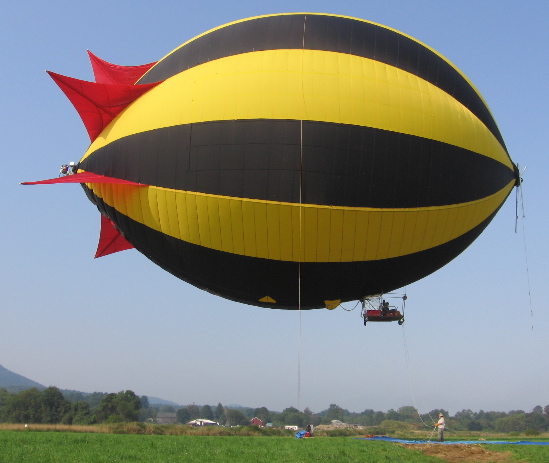
Saturday, March 10, 2007
Launch Log 2007.03.10
Today was our first time launching a cluster. This one was the FlisKits Rhino with a 4-motor cluster built with centering rings from Jon's Colorado Rocketry Components.
The Rhino had two flights and both were amazing. The first flight was on 4 A3 motors and the rocket proved to flight straight. I did a quick clean-up, regreased, reloaded, and took a second flight with 4 A10's.
After flying the Rhino, we flew Isaac's Alpha on a C6-7... we were sure we lost the rocket because there was no sight of it even a couple minutes after the launch. While Spencer and I were over in the field to the east of the launch field, we noticed the Alpha decending over the field to the south of the launch field. Wowsers - we'll have to get a pico altimeter and beacon installed in the Alpha before another flight on a C motor!
Monday, March 05, 2007
Launch Log 2007.03.04
We had a beautiful day for a launch at the school by our house today. It was a little breezy, so we started the launch with a C6 in the Outlaw to get an idea what to expect. It was a very pretty flight because the motor was extra smoky and went nice and high.
Those were the last launches of Pipes and Pencil: Pipes got tangled up in power lines and I have no idea when the power company will get it down and I doubt they'll bring it to us; Pencil was flying without a chute (because we forgot all of our chutes at home) and it turns out it doesn't do tumble-recovery so well. BTW, Pipes and Outlaw do tumble-recovery perfectly.
Shanelle went home to get chutes and then we were able to fly some more. Isaac did the prep on his Alpha rocket from Seth. The Alpha had a nice launch, but on its first flight the chute was tangled so it bounced.
Afer the Alpha launch, Spencer decided he was ready to launch his rocket from Seth - the Mighty Mouse. Mighty Mouse flew a couple times and as always it flew beautifully.
The flight was great, but got a little scary because it looked like it was coming down in a tree. It must have been just past the tree or flew through the branches.
The Alpha taking a second flight - the recovery pictures are interesting because we replaced the usual rubber shock-cord with Kevlar thread. The thread is often used in contest models because it is light.
Spencer did the count-down and pushed the button on 3 launches: 1 launch of the Pencil and 2 launches of the Mighty Mouse. He even recovered Mighty Mouse after its second flight.









